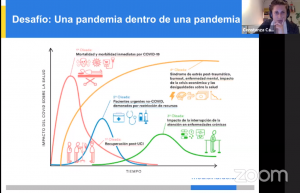Faced with mental health in times of COVID-19, the best way out of a crisis is flexibility

Mental health is a term that has taken on greater value in recent months, we began to hear it with the social outbreak experienced in October of last year and it begins to regain its strength with the pandemic, with uncertainty, fear, insecurity and stress the main feelings experienced by much of society.
During the last seminar organized by ACCDIS, they spoke with Dr. Constanza Caneo, Psychiatrist, Master of Science in Mental Health Research at University College London, Professor of the Liaison Psychiatry and Psychosomatic Medicine Unit of the Department of Psychiatry of the Pontificia Universidad Católica de Chile, who addressed the current panorama of mental health in times of COVID-19 in Chile, defining as a general diagnosis the appearance of new terms and greater emphasis on others, such as: quarantines, health crisis, unemployment and inequality.
"An imbalance between routine, teleworking, changes in schedules is beginning to be experienced, and customs are also lost in social relationships," commented the psychiatrist, who also pointed out that from the individual perspective the concern about infecting each other is noted itself and health anxiety appears, that is, "chronic pathologies are neglected, depressive syndrome, substance use, obesity and poor eating habits increase," said the expert.
Por otro lado, la doctora también comentó que es importante considerar que la salud mental es un tema global, que también afecta al personal de salud, los cuales se enfrentan en primera línea a la pandemia “tenemos un alto grado de estrés, se habla de al menos 70% de presencia de insomnio, alta tasas de depresión o traumas; miedo a contagiar a nuestras familias, conflictos éticos entre la toma de decisiones y otros elementos, que sin duda son importante considerar” enfatizó la académica.
 From the point of view of the challenge that this pandemic represents, Constanza showed a graph where the impact of COVID-19 on health is observed, highlighting with an ascending curve the mortality and lethality of the virus and then another increasing and sustained curve is shown in the time that refers to mental health "which is worrying, this is related to post-traumatic stress syndromes, mental illness, impact of the economic crisis and inequalities on health," added Caneo, who also explained that another of The alarming curves, has to do with the interruption of care for chronic diseases and those critical non-COVID-19 patients that will be affected by resource constraints.
From the point of view of the challenge that this pandemic represents, Constanza showed a graph where the impact of COVID-19 on health is observed, highlighting with an ascending curve the mortality and lethality of the virus and then another increasing and sustained curve is shown in the time that refers to mental health "which is worrying, this is related to post-traumatic stress syndromes, mental illness, impact of the economic crisis and inequalities on health," added Caneo, who also explained that another of The alarming curves, has to do with the interruption of care for chronic diseases and those critical non-COVID-19 patients that will be affected by resource constraints.
Durante la conversación la doctora aprovechó la oportunidad para explicar aquellas respuestas que son consideras normales por el ser humano, ante la vivencia de una crisis, como por ejemplo: miedo, enojo, tristeza, impotencia, culpa, preocupación, pesadillas, dolores musculares, retraimiento, desconfianza, discusiones y otros. “Somos humanos y es natural que se presenten estas sensaciones, siempre y cuando sean pasajeras y sean más los pensamientos positivos que los negativos” enfatizó Constanza.
Esto la llevó a abordar la siguiente interrogante, ¿qué debemos hacer cuando nos sentimos de este modo? A lo que respondió, en primer lugar, lo que se sugiere es generar resiliencia al estrés, se debe intentar tener un cuerpo sano y saludable que nos permita luego salir de la crisis y enfrentar otras situaciones “se pueden realizar pequeñas técnicas de meditación, por ejemplo pausas de 5 a 10 minutos” indicó.
Otro de los aspectos importantes es mantener una alimentación saludable, “se ha demostrado, que la comida chatarra y el consumo de pocos vegetales, generan más sensación de fatiga, cansancio e incluso síntomas depresivos ansiosos”. También es necesario respetar los horarios del sueño, hacer ejercicio, generar un sentido de pertenencia y objetivos y por último, pero no menos importante de ser necesario, solicitar ayuda médica.
Children and older adults
Con respecto a este grupo, la doctora ofreció una serie de recomendaciones, partiendo de la importancia de mantener rutinas flexibles, por ejemplo, el uso de la televisión, evitar noticias del coronavirus, incentivar los juegos en adultos mayores, incorporar a los integrantes de la familia en labores de la cocina u hogar y mantener la comunicación con amigos y familias.

